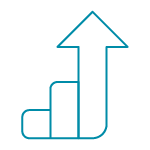
Have you ever needed to make an important decision about your business — whether it’s something simple, like deciding where to focus your energy, or something bigger, like whether to expand or when it’s healthy to increase your headcount? An informed decision is what we all strive to make, but going a step further, data is a more precise animal than general information. Any and all business decisions can be made better by adding a heaping helping of data-driven decision-making.
What Is Data-Driven Decision-Making?

For the answer to this question, and some tips on how to use this tool to your benefit, we went straight to the experts: the analysts on the Business Development team at Audigy. They have some information to share regarding data-driven decision-making and the wonders it can do in many facets of your business.
To whatever decision-making process you use in your daily business affairs, you can add another step: data-driven decision-making. It’s a step where you identify, gather, and use data to inform each and every decision you make — and validate a course of action before committing to the decision this data leads to.
Gut Instinct

Have you ever made a decision before you had all of the information, just going on facts you believe to be true? You’re not alone. Did you know more than 50% of Americans say they rely on their “gut” when determining if something is true? There’s some serious science to be studied about how people decide what to believe and why.
Occasionally, there is a lot of value in listening to that little voice inside your head, but keep that practice to events like deciding not to walk alone down a dark alley at night. While your gut may provide some direction, making decisions based purely on instinct can lead to costly mistakes that can be detrimental to your business.
Valuing intuition over evidence is a mistake that’s commonly made, but it can create problems that aren’t easy to fix. It is better to hypothesize the effects of a decision, collect data, and act according to what the data supports.
Where Do I Find Data?

Businesses have used data collection as an important tool for a very, very long time. When Crystal Pepsi (a clear beverage that tasted like Pepsi — yuck!) undersold in the ’90s, it didn’t take long for Pepsi Co. to take it off the market. Why? They saw the numbers! When stores were returning cases and cases of the stuff unsold to the manufacturer, the only logical move was to discontinue this abomination.
Data is rarely as clear-cut as a can of soda either selling or not selling. But data can be drawn from a variety of sources. It can come from company financials, tracking key performance indicators (or KPIs), survey responses, or even demographic data.
If you don’t have the data readily available within your company, there are outside resources that can be used to collect it, and Audigy can help you identify those — one of them is called Pulse.
Taking the Pulse of Your Business

The more blood, sweat, and tears you put into your business, the more it becomes something bigger than just a business. With your effort, it becomes a living thing with a heartbeat — and with a little help, you can take its pulse.
One of the ways Audigy can help you track the health of your business is held within an easy-to-use online dashboard called Pulse. Pulse pulls together KPIs like conversion rates, binaural rates, return rates, financial metrics, and inbound marketing calls so you always know how your business is performing.
Regardless of the decision you are making, there is always data to be found. In the end, you will be happy that you took the time to do your research, and you’re more likely to be successful.
The Bonuses of Becoming Data-Driven

Identify More Opportunities:
When you know what’s coming down the pike, you have the benefit of planning ahead. If you’ve tested a product or a process, and the numbers didn’t add up, you can see ahead and plan to do it differently the next time around.
When you see all of the data coming in, you gain visibility into every inch of your business. A peek into a dark corner of your enterprise that you’ve been unfamiliar with can be scary, but once you’re there and shed some light on it, it can inspire you to make some changes. It may even inspire you to try new things with your business that never would’ve occurred to you in the past. With eyes wide open on all parts of your world, you can stop doing business reactively and instead proactively change things for the better.
Boost Your Budget:
Becoming data-driven can be an important cost-saving strategy for any size of business. Using data analytics, companies can gain invaluable insights into optimizing operations, then make informed decisions. Inefficiencies in production processes can be identified more easily, and resource allocation can be shifted accordingly.
When a business can predict customer preference and accurately forecast for inventory management, for example, it can streamline workflows and cut expenses. Targeted marketing campaigns driven by data can maximize the return, making sure promotional efforts reach the right audience. View data leveraging as a compass, guiding your business toward smarter financial choices.
Feel Good About Your Choices:
Data can be put to work in a multitude of ways. Initially, it creates a baseline for how your business is currently doing. Going forward, any decision you make regarding your business will be embellished by this new knowledge. Incrementally, as you collect more and more data, you can feel more and more confident about the decisions you make because you have stone-cold facts to back them up!
Make the Most Out of Your Data
With data-driven decision-making at your back, you can proceed confidently with a decision that was supported by fact, not fiction.